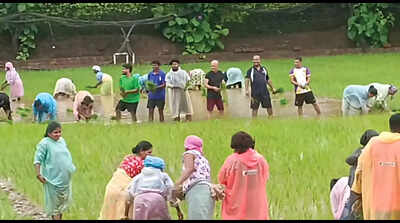ARTICLE AD BOX

Panaji: Goa’s auxiliary bishop Simiao Fernandes on Thursday surprised many villagers and seminarians at Rachol when he switched to simple shorts and a black T-shirt, putting aside his robes, to plant rice seedlings with other farmers.The bishop walked into the field at Rachol seminary and joined local farmers and seminarians in their toils. Going beyond tokenism, the bishop put in the strenuous labour that many in Goa have given up.He helped the seminarians and villagers in the field for around two hours.The auxiliary bishop went to Rachol for the inaugural of the ‘formative year’, which is the initial year or stage of a seminarian’s training. That is the day on which Rachol seminarians sow their fields with the help of neighbouring villagers.After the inaugural mass, the bishop headed to the field in his attire and blessed the people and thanked them in the name of the Cardinal. He pitched in to plant seedlings soon after lunch.“As a staff member of Rachol seminary, he would always join others in planting seeds,” a Rachol priest said. “He was quite fast in placing the saplings those days, and his agility was seen on Thursday too.”Youth from Raia, Sao Jose De Areal, Margao, and Fatorda, as well as students of Our Lady of Snows High School, Raia, dug into the farming assignment.
The rice is consumed by the seminarians throughout the year. After cultivation, the area is used to grow a range of vegetables. The extra produce is sold.The field belongs to the seminary and is on the Rachol seminary campus. Farm workers are at hand, but the seminarians also do their bit in the field throughout the year.The bishop said nature is God’s gift, and people are its stewards. “We must protect and not destroy it,” he said, appealing to people to cultivate and protect fields for society’s benefit.The Church, he said, is committed to saving agriculture in the state.



.png)
.png)
.png)
















 6 hours ago
5
6 hours ago
5









 English (US) ·
English (US) ·